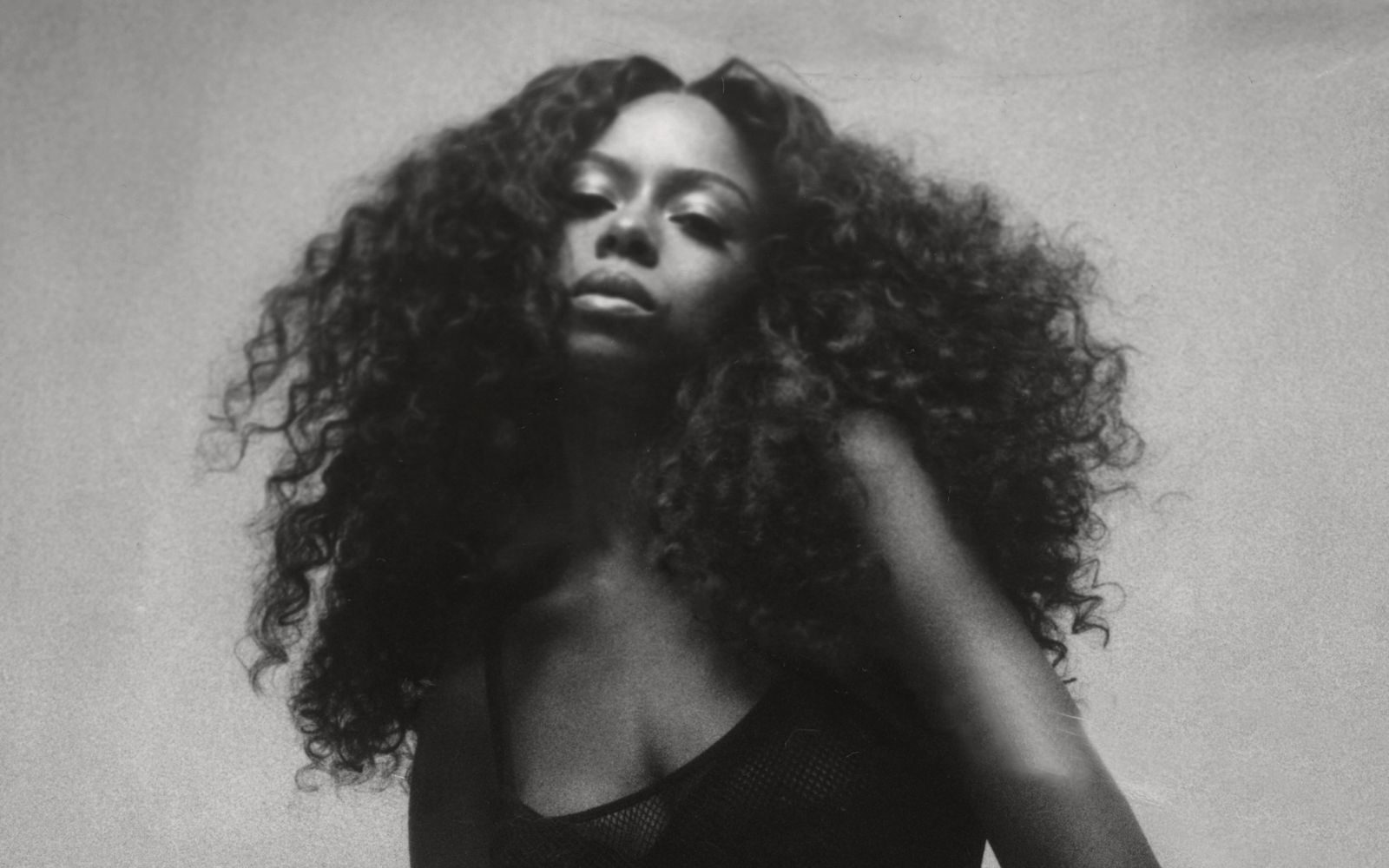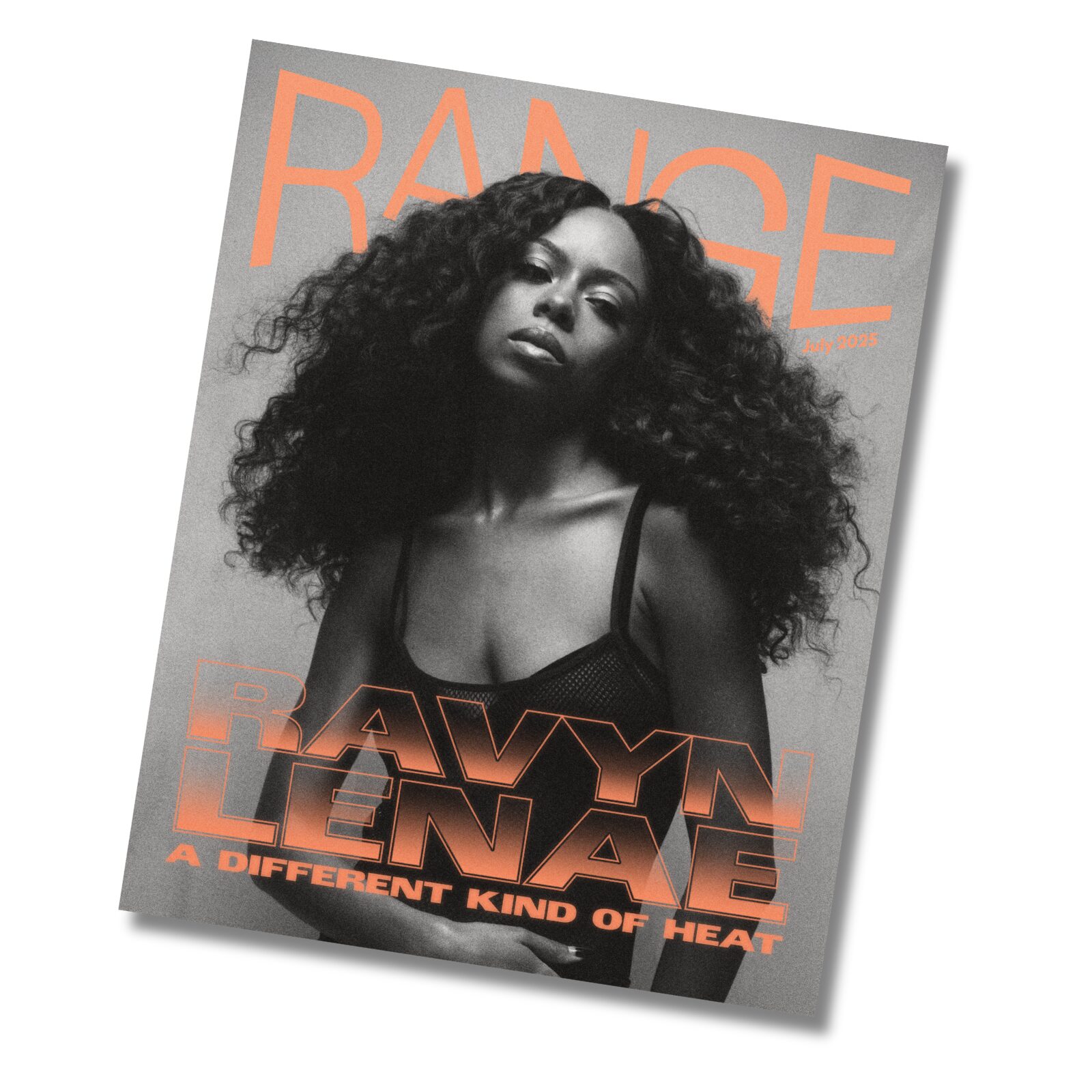By Cam Delisle
In the wake of her breakthrough third album, Through The Wall, the experimental-R&B auteur reflects on a career-defining year.

By now, the TikTok effect on music isn’t news—it’s just the game. Songs are no longer released, they’re teased in 15-second haunts, looped into oblivion before a bridge ever breathes.
And yet, amid the click-hungry maelstrom, Chicago-born alt-R&B artist Ravyn Lenae found herself going viral for a song that hardly raises its voice. Her breakout moment, “Love Me Not,” a sinuous, glitched-out slow burn, slipped into virality almost by accident.
That aforementioned virality took shape in an unlikely, yet intuitive mash-up with Solange’s “Losing You,” the kind of thing that appears in your feed when the algorithm gets weirdly tender. Something about it clicked: catharsis, release, and a little ache hiding in the bassline. It was escapist-pop at its purest—fractured emotions rendered into something palpably euphoric.

Photo: Xavier Scott
“Love Me Not” proved to be more than just a flash in the pan; it was a steady undercurrent beneath the surface noise. People looped (and looped) the mashup, not just because it was catchy, but because it acted as a release valve, a shared exhale through the smoke. When the trend inevitably faded, the just-Lenae version of the song emerged like a secret, sharp in texture and coloured by an unmistakable voice.
Talking to Lenae feels a bit like being let in on something—she’s composed but curious, with an easy kind of charm and a mind that skips ahead while you’re still catching up. She doesn’t rush to fill the silence, and when she speaks, it’s with the quiet conviction of someone who knows exactly what she wants to leave unsaid. Her sophomore LP, Birds Eye, arrives on the heels of HYPNOS—a project that snagged Pitchfork’s Best New Music stamp in 2022.
“During the process of working on Birds Eye, I opened myself up in a way that I haven’t before, to the world and to myself,” she confesses, explaining that the album’s genre-blurring tendencies came reflexively, a product of her chemistry with executive producer Dacoury “Dahi” Natche – an all-star hip-hop beatmaker responsible for tracks like Kendrick Lamar’s “Money Trees” and Drake’s “Worst Behaviour.” “It was definitely a conscious decision to free myself from expectations, boxes, or limitations, and with that, I was able to just fly and roam freely.”
She answers my questions with a calm, reflective spirituality—soft-spoken yet potent, as if the knowing is less learned and more lived. It’s the same presence that gives her music its inward glow. There’s no formula to it. For Lenae, completion lives somewhere beyond logic. “You can sense it in your body when your story is completely told… when it feels concise and impactful, you just feel it,” she tells me. It’s the same instinctive pull that guides her in the studio. Her demos are reworked not toward polish, but toward something purer—what Lenae labels as the song’s “essence.” “That’s why I take my producer relationships so sensitively, because [Dahi] knows the language, and has the ability to push it in a way that maybe I wasn’t even thinking about,” she says.
Lenae doesn’t compartmentalize her catalogue—no matter how much the sound evolves, it all lives in the same world. What shifts is the temperature, the structure, and the way that light filters in. “I think all of my projects talk to each other in the same way that seasons or phases of life do,” she says, her voice warm. “With each one, I only get closer and closer to the artist that I want to be.”

Photo: Brandon Hoeg
It’s like walking through the same dream at different hours—dawn-blushed synths here, late-night drumlines there, some moments soaked in colour and others stripped to grayscale. Across projects, she moves through lush, layered soundscapes like she’s rearranging furniture in a house that’s always been hers. Nothing stays the same, but everything belongs.
If you’ve followed Lenae’s career for a while, it might seem reductive to zero in on “Love Me Not.” It’s a familiar story: artists distilled down to one moment, one track. This one, however, carries a different weight. The track’s momentum feels like a launching pad, not a peak. She reflects on her first listen to the mash-up that would soon capture much more attention: “It made so much sense seeing it blow up in that way. There’s something so timeless about [‘Losing You’], and I think that it goes beyond genre in the way that ‘Love Me Not’ does,” she starts slowly, recalling a time when virality didn’t feel plausible. Now that it’s happened, she sees it differently—not as a shortcut, but as a reminder that things arrive when they’re meant to. “This experience showed me that although it’s so easy to think that way, it’s even easier to just let things fly and happen when they should.”
“Love Me Not” acted as a golden ticket to the kind of stages Lenae had been eyeing for years: Coachella, The BET Awards, and, in August, Lollapalooza. Though each stage carries its own energy, the challenge stays the same: winning over crowds who didn’t come just for her. It’s a skill she’s honed by touring with everyone from SZA to Omar Apollo and later this year, Sabrina Carpenter. “The idea of having to win over a crowd ignites a fire in me, almost like an athlete’s attitude, but with music,” she explains, her voice steady with focus. “Being able to be on those tours so early in my career, I was able to see firsthand what it takes to put on a great show. I was presented with the question of, ‘Can I do this?’ very early.” And now, having stepped into those same venues and held her own, she’s answered that question prophetically—proving not only that she can do it, but that she can own it.

Photo: Kennedi Carter
Lenae’s definition of owning it isn’t shouting louder than the crowd, it’s pulling them in with an intensity that unsettles the noise around her. There’s an honesty to her that resonates like a conversation you didn’t know you needed. She’s the type of artist who lets silence breathe, someone who trusts that what’s unsaid carries just as much weight as what is. It’s something she has in common with many of her idols—icons like Janet Jackson, who carved space without compromise. “I hold the Black women who came before me so close to my heart,” she says. “So many of them have made it easier for artists like myself to bounce in and run in ways that were a lot harder for them.” It’s a form of grace that cuts through the static—a powerful refusal to rush. Genius, here, doesn’t announce itself. It hides in the margins, revealing itself only for those patient enough to notice.
Lenae lights up at the mention of Jackson’s “Someone to Call My Lover,” a track that not only has she loved since high school, but is also seeing a similar TikTok-fuelled arc to her own “Love Me Not.” “Artists like Janet—who’s a pop star, and Black, and really floats to the beat of her own drum—were so inspiring for me,” she says, her words easy but exact. There’s something poetic about a track like that resurfacing—not as a relic, but as proof that real pop doesn’t expire, it just waits. The best songs don’t try to be timeless—they just are. Lenae seems to understand this instinctively. And in a timeline obsessed with immediacy, she forces you to stop, burn the incense, and find grace in the spaces that others rush past.

By Cam Delisle
In the wake of her breakthrough third album, Through The Wall, the experimental-R&B auteur reflects on a career-defining year.
By John Divney
Still processing their debut album, Vancouver’s latest art-rock unit proves collaboration is the new rebellion.
By Cam Delisle
The elusive Kevin Parker soundtracks the self-medicated search for bliss on his fifth album, Deadbeat.